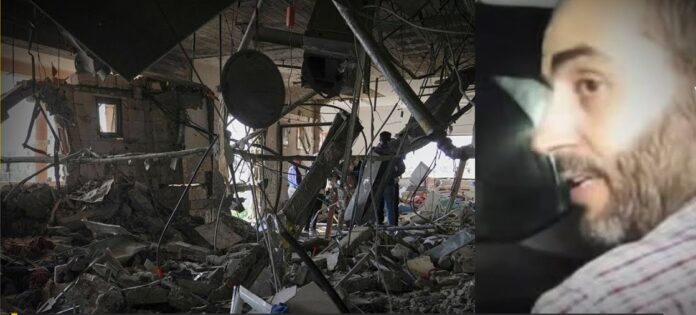Strike on Khan Younis hospital kills six, wounds 40, as Israel seeks to eliminate top Hamas commander Mohammed Sinwar
Israel launched a precision airstrike on a hospital in southern Gaza Tuesday evening, aiming to kill senior Hamas commander Mohammed Sinwar, according to a senior Israeli official and two sources familiar with the operation. The attack struck the European hospital in Khan Younis, killing six Palestinians and injuring at least 40, the Palestinian Ministry of Health reported.
The Israel Defence Forces (IDF) confirmed the hospital was targeted due to an alleged Hamas command and control centre operating beneath it. “We struck Hamas terrorists using underground infrastructure,” said an IDF statement, though it did not name Sinwar directly.
Dr Saleh Al Hams, head of nursing at the hospital, described a scene of chaos as multiple airstrikes pummelled the hospital grounds. “People are still buried under the rubble,” he said. “This is a catastrophe.” Footage from the area showed enormous plumes of smoke and dust rising from the blast zone, with medics desperately moving patients to safer sections of the hospital.
Mohammed Sinwar, the brother of slain Hamas leader Yahya Sinwar, became a de facto leader after Yahya was killed by Israeli forces last October. Both brothers were considered central architects of the deadly October 7 attack on Israel that reignited the conflict. Mohammed, a seasoned military figure, had previously led Hamas’ Khan Younis Brigade and was regarded by Israeli officials as more experienced and equally hardline compared to Yahya.
Hamas quickly rejected Israeli claims about the strike’s target. “Only the Palestinian resistance, through its official platforms, can confirm or deny such information,” a statement said.
Hours after the strike, the IDF reported that three rockets had been launched from Gaza — the first in a month — with two intercepted and one landing in an open area. Palestinian Islamic Jihad claimed responsibility. In response, the IDF issued evacuation orders for the Jabalya refugee camp and nearby areas in northern Gaza, vowing to strike any site used to launch attacks.
The timing of Israel’s latest operation has drawn global scrutiny. The strike came just a day after Hamas released Israeli-American hostage Edan Alexander in what it framed as a goodwill gesture to the United States. Negotiations are underway in Doha, with former President Donald Trump and his envoy Steve Witkoff expected to take part.
Observers say the attempt to kill Sinwar may undermine those diplomatic efforts. “He’s one of the few who could negotiate a deal for more hostage releases,” noted a senior diplomat. Former US Ambassador to Israel Dan Shapiro was more direct: “There is little chance the war can end before he dies. His removal could open the door to a post-Hamas future in Gaza.”
Still, confirmation of Sinwar’s death could take weeks or even months. When Israel targeted Mohammed Deif, another top Hamas figure, it took over two weeks for the IDF to announce his death, and Hamas didn’t confirm it for nearly six months.
Sinwar’s significance stretches back years. Yahya Sinwar had insisted on his brother’s release during the 2011 Gilad Shalit prisoner swap, in which over 1,000 Palestinians were freed. Yahya, once sentenced to four life terms, returned to Gaza and rose quickly through Hamas ranks, becoming Israel’s most hunted man post-October 7.
His eventual death came not from drones or surveillance but during a routine Israeli patrol in Rafah, southern Gaza. Now, his brother’s fate may signal a critical turning point in a conflict that has already cost thousands of lives.
